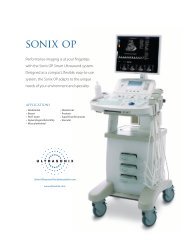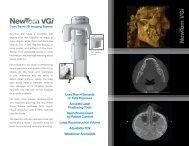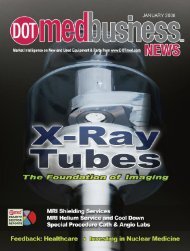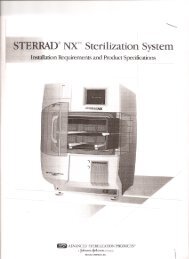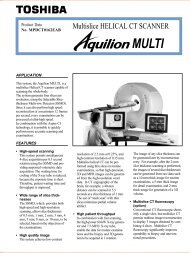I S S U E - DOTmed.com
I S S U E - DOTmed.com
I S S U E - DOTmed.com
Create successful ePaper yourself
Turn your PDF publications into a flip-book with our unique Google optimized e-Paper software.
Medical<br />
Chillers By<br />
The chiller industry as a<br />
whole has been floundering<br />
for a while now, but that’s<br />
mainly because the demand<br />
for industrial chillers and<br />
those used for the <strong>com</strong>puter tech and automobile<br />
sectors has dropped along with<br />
their industries. However, there is one<br />
area where chiller sales are still doing<br />
well - the medical chiller sector.<br />
“For us, from September last year<br />
we just had a steep drop-off in sales [as a<br />
<strong>com</strong>pany] and then in January we started<br />
seeing sales return. We’re not where<br />
we were last year, but we have orders on<br />
the book,” says Chris King, Vice Presi-<br />
dent for KR Products Inc. “With all the<br />
baby boomers <strong>com</strong>ing along, we need<br />
more and more medical equipment so it<br />
has stayed steady for us.”<br />
Although they may not be the first<br />
thing that hospitals think about when<br />
setting up shop, hospital equipment<br />
such as MRIs, CT Scans and X-rays<br />
won’t function unless they have a chiller.<br />
So as long as OEMs continue to turn<br />
out equipment, there will be a market<br />
for chillers.<br />
“The medical chiller market tends<br />
to mirror the major diagnostic equipment<br />
market, so right now, business is<br />
fairly steady,” says Bob Freudenberger,<br />
Keith Loria<br />
VP of Ellis & Watts.<br />
Basically, a chiller is like an air<br />
conditioner. Since most major medical<br />
devices generate heat while in operation,<br />
the chilled water generated by the<br />
chillers is the solution to dissipate the<br />
heat that is produced. The difference is<br />
you are removing heat from the fluid<br />
and not the air.<br />
“Each chiller provides a defined<br />
flow rate and temperature drop specification,”<br />
says Freudenberger. “Some<br />
have optional city water bypass valve<br />
systems to allow operation of the medical<br />
equipment, even during a time of<br />
service or failure of the chiller system.”<br />
<strong>DOTmed</strong>business news I s e p t e m b e r 2009 41




